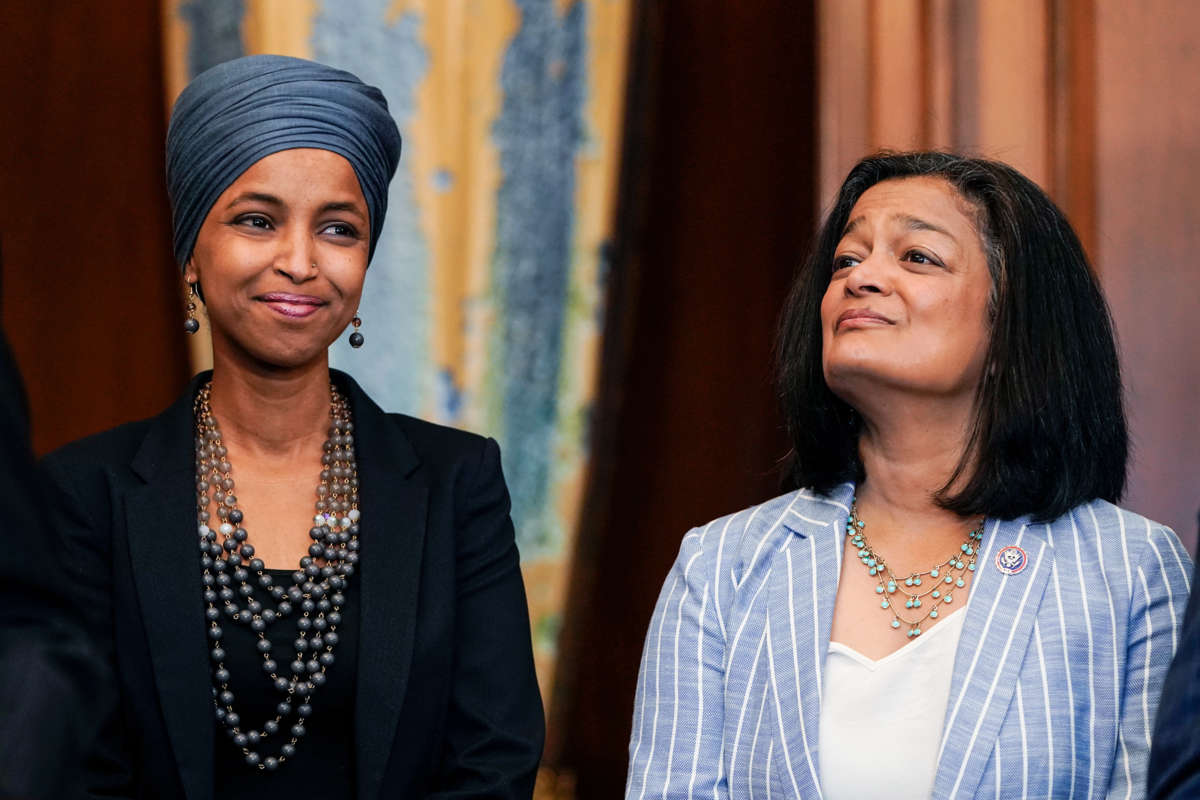Support justice-driven, accurate and transparent news — make a quick donation to Truthout today!
Shortly after the Senate passed a $550 billion bipartisan infrastructure package on Tuesday, the Congressional Progressive Caucus said a survey of its nearly 100 members showed that a majority of respondents are prepared to withhold their votes for the newly approved legislation until the upper chamber also greenlights a sweeping reconciliation bill.
In a letter to House Speaker Nancy Pelosi (D-Calif.) and Senate Majority Leader Chuck Schumer (D-N.Y.), three top CPC members led by caucus chair Rep. Pramila Jayapal (D-Wash.) wrote that their fellow progressive lawmakers were “specifically asked” whether they would “commit to withholding a yes vote on the bipartisan infrastructure deal… until the Senate has passed budget reconciliation legislation deemed acceptable by the Congressional Progressive Caucus.”
“A majority of our respondents affirmed that they would withhold their votes in support of the bipartisan legislation in the House of Representatives until the Senate adopted a robust reconciliation package,” reads the letter, which was also signed by Reps. Katie Porter (D-Calif.) and Ilhan Omar (D-Minn.).
“We therefore encourage you to continue coordinating closely between the two chambers, collaborating with the White House, and engaging with our caucus so that the reconciliation framework reflects our shared and longstanding investment priorities, and that the Senate first
adopts this reconciliation package before House consideration of any bipartisan infrastructure legislation,” the trio added.
The letter does not specify how many of the CPC’s 96 members responded to the survey, nor does it say how many members answered affirmatively.
In a statement on Tuesday, Jayapal said the internal survey results “affirm the urgency of ensuring that the Senate’s desire to pass a narrower bipartisan infrastructure agreement does not come at the expense of the full scope investments our communities need, want, and deserve.”
“Our caucus is clear: the bipartisan bill will only be passed if a package of social, human, and climate infrastructure — reflecting long-standing Democratic priorities — is passed simultaneously through budget reconciliation,” Jayapal said. “We know that congressional Democrats are committed to delivering immediate and transformational improvements for the lives of the American people, and will hold firm to meet that promise.”
Our Caucus has been clear: Congress must invest in infrastructure that takes on the climate crisis and meets the needs of working families.
CPC members won't support a bipartisan bill without a bold reconciliation bill to advance our priorities. pic.twitter.com/ptM06hKt1s
— Progressive Caucus (@USProgressives) August 10, 2021
Following its passage of the $550 billion bipartisan infrastructure bill — which climate advocates and other progressives have slammed as woefully insufficient and even actively harmful — the Senate voted along party lines to begin debate on the $3.5 trillion budget resolution that Sen. Bernie Sanders (I-Vt.) unveiled on Monday.
That resolution establishes the outer boundaries of an eventual legislative package that Democrats hope to pass using the filibuster-proof budget reconciliation process, a route that allows them to circumvent Republican obstruction.
“My Republican colleagues are upset that we are using the reconciliation process, and only 50 votes, to pass this budget,” Sanders, the chair of the Senate Budget Committee, said in remarks on the Senate floor Tuesday. “But let us be clear: This idea of using reconciliation is certainly not a new idea. When Republicans controlled the Senate, they used reconciliation to pass trillions of dollars in tax breaks to the top 1% and large corporations.”
“Well, today, it is true, we will also use reconciliation, but we will do it in a different way,” Sanders continued. “We will use it to help the working families of this country, and not just the wealthy and the powerful.”
Unprecedented times require unprecedented action. I’m LIVE on the Senate floor NOW as we start debate on the most consequential legislation for the working class since the New Deal. https://t.co/6V2LnMJmlJ
— Bernie Sanders (@SenSanders) August 10, 2021
The budget resolution that the Senate is currently debating contains a wide array of proposals, including funding for green energy development, a pathway to citizenship for millions of undocumented immigrants, an expansion of Medicare benefits and a lowering of the program’s eligibility age, paid family and medical leave, and universal pre-K.
The blueprint must now be converted into legislative text, a process that is expected to drag out until mid-September.
With the support of progressive lawmakers, Pelosi has said that she will not allow a vote on the newly passed bipartisan infrastructure package until the Senate also approves a reconciliation bill. That strategy has drawn pushback from conservative House Democrats, six of whom are circulating a letter urging Pelosi to hold a standalone vote on the bipartisan bill “without regard to other legislation,” a clear reference to the emerging reconciliation package.
But judging by the CPC’s internal survey and given Democrats’ slim margin of control in the House, progressive lawmakers likely have the votes to block the bipartisan package should it reach the floor before the Senate passes a reconciliation bill.
“I’m glad to see the Senate pass an infrastructure bill that invests critically needed dollars into our roads, bridges, and waterways,” Jayapal tweeted Tuesday. “This funding MUST be accompanied by a jobs and families plan that lifts up working people and guarantees no one is left behind in this recovery.”
Media that fights fascism
Truthout is funded almost entirely by readers — that’s why we can speak truth to power and cut against the mainstream narrative. But independent journalists at Truthout face mounting political repression under Trump.
We rely on your support to survive McCarthyist censorship. Please make a tax-deductible one-time or monthly donation.
